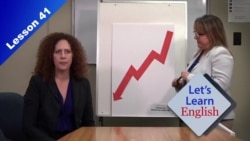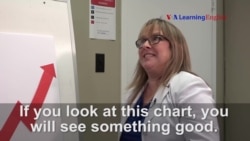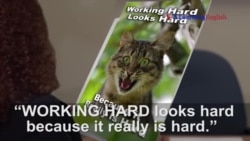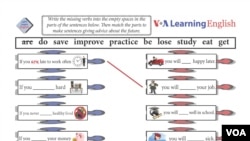Summary
Anna meets with her boss, Ms. Weaver, for her yearly review. Ms. Weaver wants Anna to have higher numbers for the audience of her show. How will Anna make her audience numbers go up?
Speaking
In this video, learn how to say the new words. Then learn about sentences that include the words "if" and "will." These are called present real conditional sentences.
Pronunciation
When we want our listener to notice one or two words in a sentence, we can say them louder, or put more emphasis on them. Learn how to do that in this video.
Conversation
Anna: Hi. I am walking to work. Today my boss will tell me what she thinks of my work. Is it good? Or is it bad? Okay, time for work. I am going right now. Okay, okay, I’m going!
Writing
In this lesson, what do you think Ms. Weaver wants? Do you ever have trouble understanding the advice that others give you? Write to us by email or in the Comments section.
Click on the image below to download the Activity Sheet and practice making sentences with "if."
Learning Strategy
Learning Strategies are the thoughts and actions that help make learning easier or more effective.
The learning strategy for this lesson is Use Selective Attention. When you are listening in English, sometimes we can't understand every word. At those times, you can listen for the important words and try your best to understand.
In this lesson, Anna tries to understand Ms. Weaver. Ms. Weaver wants Anna to get a bigger audience. But Anna pays attention to the cats in the posters that Ms. Weaver shows her. She thinks Ms. Weaver wants to see more cats in The Time Traveling Treehouse.
When you use selective attention, you may not always understand perfectly. But you can always ask a question to check on your understanding. Anna did not ask to make sure of what Ms.Weaver wanted. In real life, you should check your understanding when you use selective attention.
Do you ever use selective attention? Do you think Anna made a mistake when she used selective attention in this lesson? Write to us about it in the Comments section or send us an email. Teachers, see the Lesson Plan for more details on teaching this strategy.
Quiz
Listen to short videos and test your listening skills with this quiz.
______________________________________________________________
New Words
Free Materials
Download the VOA Learning English Word Book for a dictionary of the words we use on this website.
Each Let's Learn English lesson has an Activity Sheet for extra practice on your own or in the classroom. In this lesson, you can use it to practice making conditional sentences.
For Teachers
See the Lesson Plan for this lesson for ideas and more teaching resources. Send us an email if you have comments on this course or questions.
Grammar: Future Real Conditional (If clauses)
Topics: Asking for & giving feedback about job performance; Identifying ways to improve performance at work or school; Interpreting advice
Learning Strategy: Use Selective Attention
Speaking & Pronunciation: Pronouncing contrastive stress
____________________________________________________________
Now it's your turn. Send us an email or write to us in the Comments section below or on our Facebook page to let us know what you think of this lesson.










